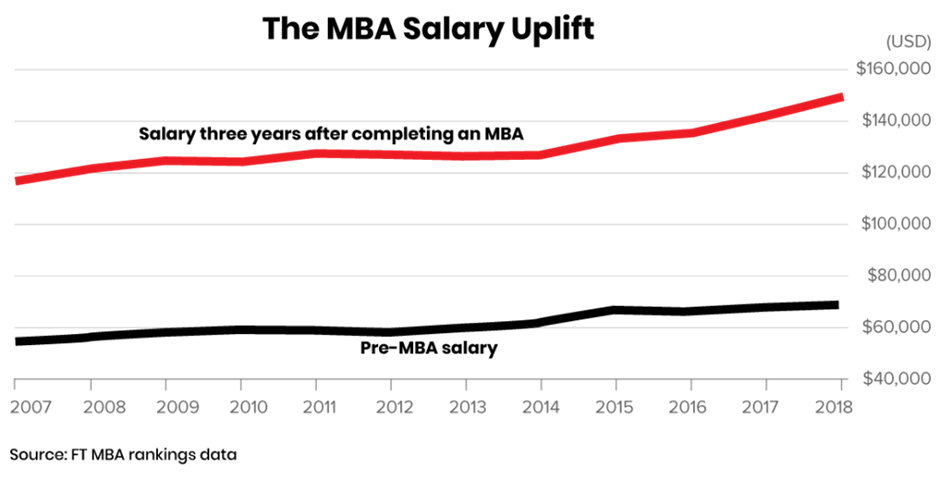Differentiate yourself! (+Satya Nadella’s interview excerpts)
A top B-school could produce tons of graduates every year but how many of them go on to make it really big? What is it that really differentiates and sets those people apart from the others?
PROLOGUE 1:
When the subject of whether one needs an MBA to be successful or not has been doing the rounds for many years now, that’s definitely beyond the scope & not even remotely connected to the central idea of this article.
For starters, the herd mentality is a total killer and it ought to be done away with. Never do stuff because someone else whom you notice shining bright today had done something similar earlier in his lifetime. Enroll for that course, pick up that degree because you are hungry for knowledge (or) you have a vision and a clearly charted out plan and make the course a precursor in supporting you achieve and get there. Always think long term.
Food for Thought!
Every year in India you have B-schools producing tons of graduates which am sure might not be all that different over the other parts of the world as well. Skimming around the internet you’d find many of these banners floating around in abundance all related to the topic of how a very small percentage of these graduates are really employable in the real world.
Here is a collage of such news headlines from articles over the years.
But, in spite of that you have more and more people signing up for courses which focus on offering all the help towards cracking those competitive exams – CAT, GRE, G-MAT for instance. Going by the records of such coaching institutes as well there seems to be no drop at all over the number of sign-ups they cater to YoY.
Sense something off place, do you? Well! Welcome to the club and you aren’t alone.
Why is that people still queue up joining the rat race to gain some coaching over clearing those exams and get into a B-school to pursue their MBA dream when the stats from those very same B-schools reveal results that are skewed to the opposite over finding employment?
An pragmatic explanation - the whole motivation is tilted and fixated on the salary, remuneration & perks part of it.
Here is some data.
The trendlines here show an approximate of 100 – 120% increase in the salary range before and after candidates get their MBA degrees.
Combining the 2 stories over the images above, the logical inference is that it could be a one in a million’s chance for someone to get into a B-school, finish their MBA & then get to doubling their salary prospects over landing a job.
But having said all of that there are perhaps the top 1% representing the crème de la crème graduating from those B-schools who have some big steps planned ahead and their whole purpose of entering a B-school is to gain the knowhow over understanding the obstacles and various methods, frameworks, approaches that would help combat situations, helping them take baby steps in treading the path towards realizing that “Big Vision”.
Now that we are talking about the “big picture thinking” / “big vision”, let’s spend some time over exploring and understanding what is it that perhaps sets those people apart from a majority of the crowd.
Differentiation is “The Approach”
Am sure many of you might have come across this line at some point in your life.
The bottom is always crowded when there is always room at the top. In essence, it talks about how there could be minimal occupancy and an eternal scarcity up there regardless of the field and how one could get to securing that top position if one is able to differentiate oneself from a major portion of the crowd.
What may sound an idealistic scenario / Utopic may not actually be that difficult or inaccessible. Yes, but finding a key element that could prove to be a differentiator and working consistently giving it your undivided attention to factoring even the minute mistakes and making a ruddy habit of it more like a mundane routine over analyzing & improving could be the first & the last steps to get to that all-coveted “Zenith” and stay there.
And post that entire exercise you ought to have a clearer picture of that one / few chief differentiator(s) right there at the core of that entire almanac putting you in the clear and setting you apart from the rest of the crowd.
Also, when it is natural to think that your strengths are your differentiators that could also well and truly cover the understanding of the ways that could lead you towards failure and how you’re going to avoid them now.
FAIR WARNING: The 4 steps above could look ridiculously simple but may also be the toughest thing to do because if it were really so simple we’d have had everyone digging into their workflows, soul-searching and ending up with tons of findings over their behavioral patterns and how they’d need to come to grips with it all. But, as we know the world around us - it’s so far from the truth and is also a far-fetched idea for most of them.
No Red Carpet Welcomes
Nobody has everything in their life laid out and offered over a red-carpet welcome.
Never ever are all conditions feasible for all people. Take an average day over your own work for instance. Many things could go haywire and would need your intervention & also the amount of time you invest over intervening / collaborating with your teams would have a direct proportionality to the amount of damage that’s caused / impeding impact as assessed.
As much as it is about constantly having to fend off oneself from troubles, at the same time it demands a sense of calmness, composure and being able to handle it with a lot of maturity. Successful people of the world carry that quality as one of the prime differentiators in them.
Were they born with that trait?
May be not in most of the cases. It is a precious skill that ought to be earned & meticulously polished by the turn of every tide over ample life lessons, learnings from getting one’s neck stuck in each of such sticky situations and getting out as well.
Examples are aplenty around us right from leaders like Jeff Bezos, Satya Nadella over how they overcame problems & sticky situations by trusting their ability and deeply introspecting leading to the identification of paths that’d help them differentiate themselves whilst also making that a habit / a routine.
Excerpts from Satya Nadella’s Interview
Over a David Rubenstein interview Satya Nadella, the current CEO of Microsoft reminisces and talks about his initial meeting with Steve Ballmer & Bill Gates. Right after he was onboarded he clearly mentions how he was told “rather warned” by the duo not to try and emulate them but rather be himself and stick to the values he believes in over taking products & the org ahead to the next cycle of growth.
The differentiator in his case was the clarity he had over:
carefully choosing battles that ought to be fought over the ones that ought to be dropped
mustering a team that’s sold around a solid holistic vision, motivating them & helping them collaborate better
instilling a sense of ownership & accountability to all the teams & members involved ensuring that it is propagated top-down
building a culture around values that matter (for instance - a deeper sense of empathy)










